
Related
A British court heard evidence last week that Secretary of State Hillary Clinton tried to prevent the disclosure of details regarding the CIA’s role in the alleged torture of former Guantanamo Bay prisoner Binyam Mohamed. We hear from conservative British parliamentarian David Davis about the Obama administration’s attempts to suppress evidence in this case. [includes rush transcript]
Transcript
AMY GOODMAN: A British court heard evidence last week that Secretary of State Hillary Clinton tried to prevent the disclosure of details regarding the CIA’s role in the alleged torture of former Guantanamo prisoner Binyam Mohamed. Newly revealed British government documents show Clinton warned British officials the Obama administration would end intelligence sharing if it revealed evidence in Mohamed’s case. Mohamed was released from Guantanamo in late February after seven years in US custody. He says he was repeatedly tortured at a secret CIA prison and at Guantanamo.
Well, earlier this year, the leading conservative British parliamentarian, David Davis, came here to the United States to speak with US lawmakers about Mohamed’s case. Davis, a former shadow home secretary and a former member of the British special forces, has been critical of torture and “extraordinary rendition.”
I spoke with Davis about the attempts by the Obama administration to suppress evidence in this case.
DAVID DAVIS: We have in Britain at the moment a court case underway about torture. It’s one of, we think, fifteen cases of really serious torture. We’re not talking waterboarding here. We’re talking scalpels and beatings and cutting people in unpleasant places. That case is beginning to show complicity in that torture on the part of British intelligence agencies.
The judges want to release some information to the public, very carefully selected information, not detailed security information, and they have not been able to, because the US administration has written to the court, written to the foreign office and then to the court, saying if they release this sort of information, they’ll cut off intelligence cooperation or reduce intelligence cooperation with the United Kingdom. Now, that’s a serious threat. The judges referred to it as a “threat” eight times in their judgment, and they clearly thought we ought to know what’s been going on, what’s been happening with British intelligence agencies’ involvement in torture. We can’t do it, because the Americans are stopping us.
AMY GOODMAN: Clive Stafford Smith, Binyam Mohamed’s lawyer, sent a letter to President Obama, and they’re being threatened for sending the letter containing information about what happened to him.
DAVID DAVIS: Yeah.
AMY GOODMAN: Explain it.
DAVID DAVIS: Well, that was astonishing. I mean, they got a letter from the US government saying — which was almost entirely redacted. There was nothing — you know, it was all blocked out. It was just black lines, this whole letter. And to make the point about how restrictive the government was being, Clive included that letter, sending it to the President, and he was told that’s an offense. Now, to tell your president what’s going on is offense seems really rather strange.
AMY GOODMAN: You’re a conservative member of Parliament.
DAVID DAVIS: Yeah.
AMY GOODMAN: So you’re known as someone who’s very tough on the war on terror.
DAVID DAVIS: Yeah.
AMY GOODMAN: So, what brings you here?
DAVID DAVIS: Well, I don’t want the American government, the American administration, to be inadvertently involved in a cover-up. I want to see us defeat the terrorists. I want to see us defeat al-Qaeda. But we don’t do that by using methods like torture. And if we have been using methods like torture, as it appears we have, we need to know about it, and we need to stop it.
I mean, torture — torture is wrong for all sorts of reasons. It’s illegal. It’s immoral. It doesn’t work. It takes away the moral high ground. Most of the guys who fight in our special forces and our agents in our intelligence agencies want to think they’re on the side of right, not the side that tortures people. So it puts them in the wrong, too. It undermines their morale. And finally, it’s a fantastic propaganda working for the other side. I mean, Guantanamo, Abu Ghraib have turned out to be the greatest propaganda weapons for al-Qaeda. Torture is another one, and we’ve got to put a stop to it. We’ve got to clean it out and make our decision as to how we’re going to run our war against terror, and we do that by using civilized methods, not barbarian ones.
AMY GOODMAN: Who have you come to speak to in this country?
DAVID DAVIS: Well, a number of congressmen, Congressman Delahunt, in particular, because he is the — he is the chairman of the Human Rights Subcommittee of your Foreign Affairs Committee, I think. And I’m going to see the legal team at the White House, the legal team at the State Department, and a number of other congressmen and senators, because I just want the legislative branch and the administrative branch to know precisely what they’re doing.
Torture is an absolute crime in the United Kingdom. Covering up torture is a crime, too. And what’s happening here is, by writing these letters, threatening to withhold intelligence cooperation with the United Kingdom, if our judges, senior judges, effectively Supreme Court judges, put limited information in the public domain, is not the action of an ally. And I don’t think, actually, that people quite realize quite how serious it is.
AMY GOODMAN: Binyam Mohamed, in an interview that he did, the first prisoner released under President Obama, said that the conditions at Guantanamo got worse under President Obama.
DAVID DAVIS: Is that right? I’m not really aware of that. I mean, certainly towards the end, he — obviously, there was more pressure. I’m not sure whether that’s a result of the change of administration or whether it’s a result of the behavior of the inmates. I can’t tell you that. I’m not expert on that.
My concern is what happened before he went to Guantanamo. And, I mean, he went — he was sent to Morocco, and he was tortured —-
AMY GOODMAN: Explain his case.
DAVID DAVIS: —- with scalpels. He had his penis cut with scalpels, other parts of himself cut with scalpels. He was tortured by the Pakistanis. As I said, it’s not just waterboarding we’re talking about here. This is really brutal, almost medieval torture. And it looks to us — it’s very — I mean, there is a criminal case, a secret criminal case, being investigated at the moment in the UK on this. We don’t know what the details are.
AMY GOODMAN: What do you mean, a secret criminal case?
DAVID DAVIS: Well, there are forty-two documents involved in this case, and they were given to the police by our attorney general about a month ago, because she thinks it’s a prima facie criminal case, because torture is an absolute wrong. It’s an absolute crime in the UK, and complicity in it, tolerance of it, using it to get information are all crimes. So we have to make sure that we have not done that, and if we have, we put a stop to it.
AMY GOODMAN: And who do you believe are the British officials who are involved?
DAVID DAVIS: Well, there would be MI5 and MI6 agents. But there’s this particular arrangement in Britain. The law in Britain says our agents can break the law, but with direct approval from the minister. I was the minister that ended up taking that law through Parliament. I know it very well. So they can burgle or blackmail or bribe, as special agents do. Nobody ever thought it would be used for torture. But if they’ve done it and it’s been approved by a minister, then that’s even more serious.
AMY GOODMAN: Photographs — this has become a major issue, President Obama first saying he would release photographs of torture, now saying he will not. Binyam Mohamed says that — or counsel says that there are photographs of his torture?
DAVID DAVIS: Mm-hmm, yes. I mean, all of this — all of this will provide a — I’m — there are two things here. I am not in the business of giving easy propaganda victories to our enemies, right? And so, there could be an argument both ways on photographs. But we’re not talking about that at the moment. This is really, really much simpler than that. This is evidence that has been cleaned up to make sure it doesn’t give any intelligence data away. This is evidence that just says who’s been involved, what’s the complicity, what’s the degree of complicity. That’s the most important part.
Photographs will maybe reinforce it, but frankly, it’s the original judge’s statement that we want to put in the public domain. And the American government is stopping that, stopping effectively what in your context would be a Supreme Court judge from telling the public what he thinks it’s right to tell them. This is a man who’s a specialist in terrorist trials. He’s not going to give away data to our enemies. Why are the American government doing it? I don’t understand it.
AMY GOODMAN: Why do you have to come here? I mean, why wouldn’t your prime minister? Why wouldn’t Gordon Brown be weighing in here?
DAVID DAVIS: Well, this may well be to the advantage of our government, because if there is complicity and this is a ministerial involvement, this will be very, very embarrassing to the government. They, themselves, will be upset. There is a suggestion, in fact, that even that they asked for the letter to stop the court. I don’t know whether it’s true or not, but that’s been suggested. So this is a sort of collusion and a cover-up, if you like, between both governments.
AMY GOODMAN: Information surfacing in Britain that there was a confidential informant in Morocco who knew Binyam Mohamed at the time that the British government was saying they didn’t know where he was, when he was being held there.
DAVID DAVIS: Yeah.
AMY GOODMAN: What information do you have about this?
DAVID DAVIS: Well, there was one person who had said this to a journalist. But worse than that, I mean, we — at one point, a UK intelligence agent said to the court, “We didn’t know where he went after he left Pakistan.” Then, they suddenly found thirteen more documents, and they had to tell the court, “Well, actually, that appears not to be true,” that piece of evidence. So what it looks like is that the agencies have not exactly told the whole truth. And there’s more than just another inmate of the prisons. There seems to be documentary evidence that they actually knew where he was, i.e. in Morocco. And you would send such a man to Morocco, for what reason, other than to use their interrogation techniques, which are not ones that we would use, nor indeed you would use?
AMY GOODMAN: Would you consider your counterparts here more the Republican senators and congressmen than the Democrats?
DAVID DAVIS: Yes. Oh, absolutely. I mean, you know, I’m a right-of-center politician, and many of them won’t be happy about this. But the simple truth is that you are coming to terms with what happened under the previous administration, hopefully stopping it ever happening again. We need to do the same for Britain. You know, and we’re an ally. You should be helping us do that, not stopping us doing it.
AMY GOODMAN: What about Guantanamo prisoners being relocated with the closing of Guantanamo? What is your position on Guantanamo prisoners coming, say, to Britain?
DAVID DAVIS: Well, we’ve taken some back already. And I think it’s very simple: you either put them through the courts and prosecute them, or you do what you need to do if you think somebody’s dangerous but you can’t prove it, which is surveillance and the like. What you don’t do is leave them in limbo forever.
AMY GOODMAN: That is David Davis, a former shadow home secretary in Britain, former member of the British special forces, has been critical of torture and extraordinary rendition. He is a conservative British MP right now. He came earlier this year to the United States to lobby folks in Washington. Last week, a court, a British court, heard evidence that Secretary of State Hillary Clinton tried to prevent the disclosure of details regarding the CIA’s role in the alleged torture of former Guantanamo Bay prisoner Binyam Mohamed, the case that Davis has come to New York and to Washington to speak about.

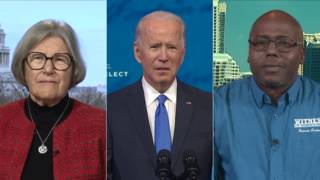
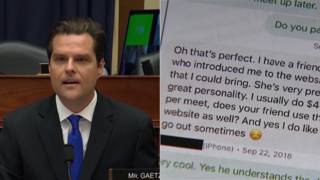
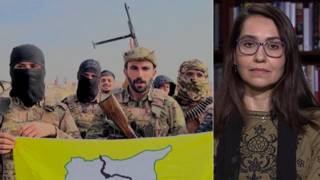
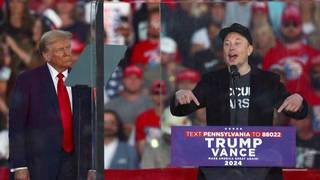





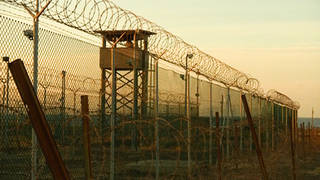
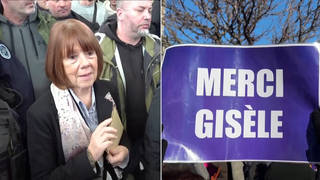
Media Options